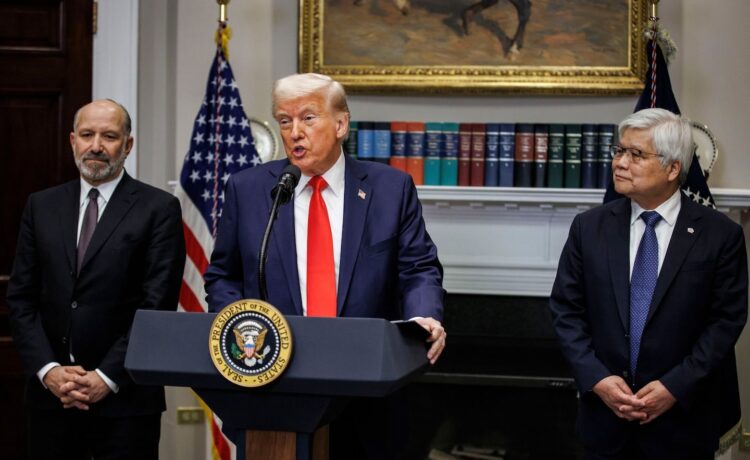But like some other “Trump effect” investments, Trump doesn’t deserve all the credit.
TSMC said it had already spent $65 billion in Arizona over the past five years to build two fabrication facilities on its sprawling Phoenix campus and was weeks from breaking ground on a third after the Biden administration gave it a $6.6 billion grant from the 2022 CHIPS and Science Act last year. Senator Mark Kelly, an Arizona Democrat, told the Globe that the company had showed him plans to expand to six so-called fabs a couple of years ago. And a company spokesperson said the additional $100 billion investment could be eligible for a 25 percent tax credit in the 2022 law.
“That would not have happened without a lot of work that happened during the Biden administration,” Martin Chorzempa, a senior fellow at the nonpartisan Peterson Institute for International Economics think tank, said of TSMC’s promised investment.
As Trump passed the 100-day mark in office last week, the White House touted a growing list of more than 50 announcements by private companies since Jan. 20 to invest more than $5 trillion in the United States. Trump boasted about them Tuesday during an Oval Office meeting with the new Canadian prime minister.
“The biggest investment ever made in the United States is being made right now, trillions of dollars,” he said, estimating without any evidence that it could be as much as $9 trillion so far.
But it’s not as impressive as it seems.
Many are simply corporate pledges that might never fully come through, as was the case during Trump’s first term, when electronics maker Foxconn promised $10 billion to a Wisconsin project that later was dramatically scaled back. Some are a continuation of earlier investment commitments or were in the works well before Trump took office, like the Roche Genentech Innovation Center Boston, part of a $50 billion US investment announced by the Swiss pharmaceutical company in April. Massachusetts Governor Maura Healey’s office said the new research and development center was the subject of talks that began in early 2024.
And at least one announcement appears to have nothing to do with Trump. The White House lists automaker Stellantis’ decision to spend $1.2 billion to reopen its Belvidere, Ill., factory as a Trump investment. The announcement, which came just two days after Trump took office, fulfills a commitment the company made in a 2023 union contract and follows a $334 million grant last July from the Biden administration to help restart the facility.
“He doesn’t have really anything that he’s done, so he’s taking credit for what other people have done,” said Senator Tammy Duckworth, an Illinois Democrat who helped secure the grant for Stellantis.
Presidents often take credit for the good things that happen while they’re in office. Joe Biden said in February 2024 that the CHIPS Act had attracted $640 billion in private investments, an assertion that nonpartisan Politifact rated as “mostly false” because it included the effects of other legislation and “not every project will come to fruition.”
But Trump — prone to hyperbole and outright falsehoods — is taking things to a new level. He started claiming credit from the moment he took office, even as he has tried to shift blame to Biden for the economic slowdown in the first three months of this year.
“Every administration wants to take credit for investment that is occurring under their watch and into the future, and companies are happy to oblige them with a really big number that gives them political points,” Chorzempa said. “You obviously have to take it with a grain of salt.”
Trump’s tariffs could actually threaten the timing and future of some of the promised investments.
“The uncertainty and instability has definitely frozen investment,” said Senator Ron Johnson, a Wisconsin Republican. “People aren’t going to risk their capital if they don’t know what the deal is on taxes, on regulation, on tariffs.”
The White House defended Trump as a “dealmaker in chief.”
“By slashing regulations, lowering energy costs, enacting tariffs, and closely coordinating with the private sector, the Trump administration is securing trillions in historic investment commitments for the long-term restoration of American greatness,” said White House spokesperson Kush Desai.
Meanwhile, the White House keeps touting announcements.
On Thursday, German automaker Mercedes-Benz said it would start producing an unspecified “new car, tailored to US customer preferences,” at its Tuscaloosa, Ala., factory in 2027. The White House called it “the latest result of President Donald J. Trump’s relentless pursuit of American manufacturing dominance” — a strategy that includes 25 percent tariffs on imported automobiles.
Mercedes-Benz said the move was just another step in its “local-for-local approach” of building vehicles where they’re sold. For example, Mercedes-Benz began a $59 million expansion of its Charleston, S.C., factory in 2021 to build electric vans.
“In the US, we have been localizing products for almost 30 years. And if market conditions are suitable, we will continue to do so,” a Mercedes-Benz spokesperson said in a statement. She declined to say if the tariffs played a role.
Roche‘s April 21 pledge of $50 billion in US investments over the next five years shows how those announcements can seem more significant than they actually are.
Among the projects the company listed is “a state-of-the-art gene therapy manufacturing facility in Pennsylvania” that has been under construction since 2023. And the March 7 announcement of Roche‘s new Boston innovation center came after Healey and Massachusetts Economic Development Secretary Yvonne Hao met with company officials “several times beginning in early 2024 to discuss their expansion here,” said Healey spokesperson Karissa Hand.
Sometimes it can be difficult to assign credit to a presidential administration for luring private investments that take years to come to fruition. The TSMC computer chip manufacturing complex in Arizona highlights the problem.
The Taiwanese company announced the project in 2020 during Trump’s first term, pledging to spend $12 billion. The effort got a significant boost with passage of the CHIPS Act in 2022, and TSMC increased its planned investment to $40 billion. The promise of as much as $6.6 billion in federal grant money in April 2024 led the company to commit to a third fab and a $65 billion total investment.
But some of the investments the White House has been hyping could end up being undermined by Trump’s policies.
Three days after the TSMC’s March 3 announcement, Trump called for Congress to end the “horrible” CHIPS Act, asserting that companies weren’t spending the grants and that his administration didn’t have to give TSMC any money to convince it to increase manufacturing capacity in the United States.
“They will come because they won’t have to pay tariffs if they build in America,” Trump said in his March 6 address to Congress.
But a TSMC spokesperson said the company hopes the $100 billion expansion can benefit from the 25 percent CHIPS tax credit.
While the Trump administration deserves some credit for the expansion because of its willingness to use the tariff threat to push TSMC for more US production, the Biden administration’s efforts helped lay the groundwork and the tax credit remains a major lure, Chorzempa said. But other Trump tariffs, like those on the steel and aluminum needed to construct the computer chip fabrication facilities, could make it more difficult for TSMC’s promised investment to turn into reality, he said.
“The tariffs have, in fact, injected a lot more uncertainty and cost into the enterprise of creating chips in the United States,” Chorzempa said.
Jim Puzzanghera can be reached at [email protected]. Follow him @JimPuzzanghera.





